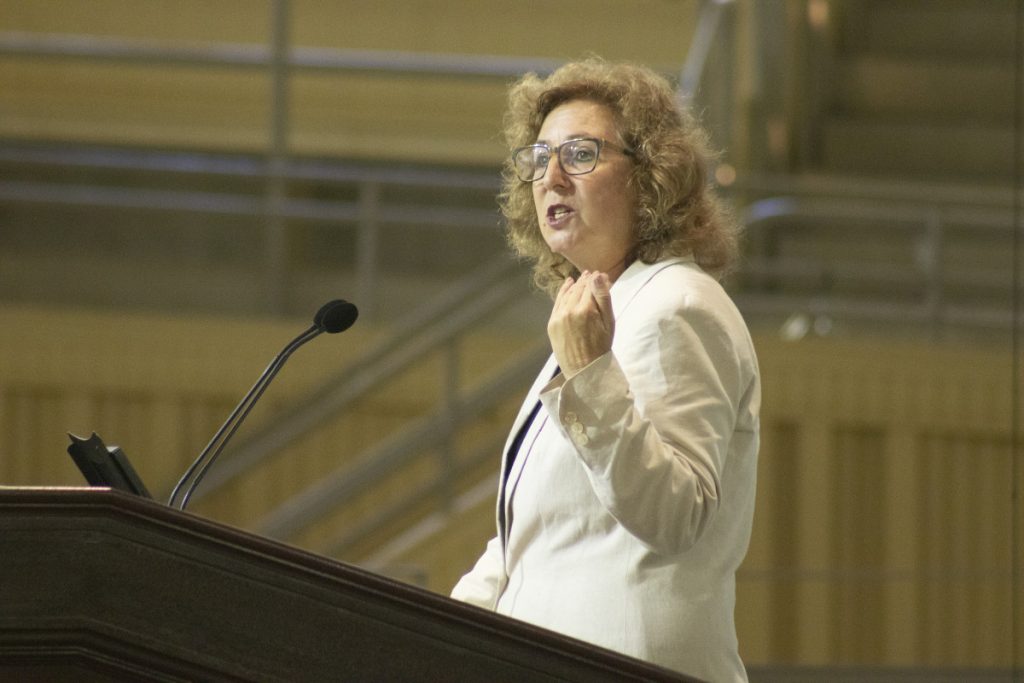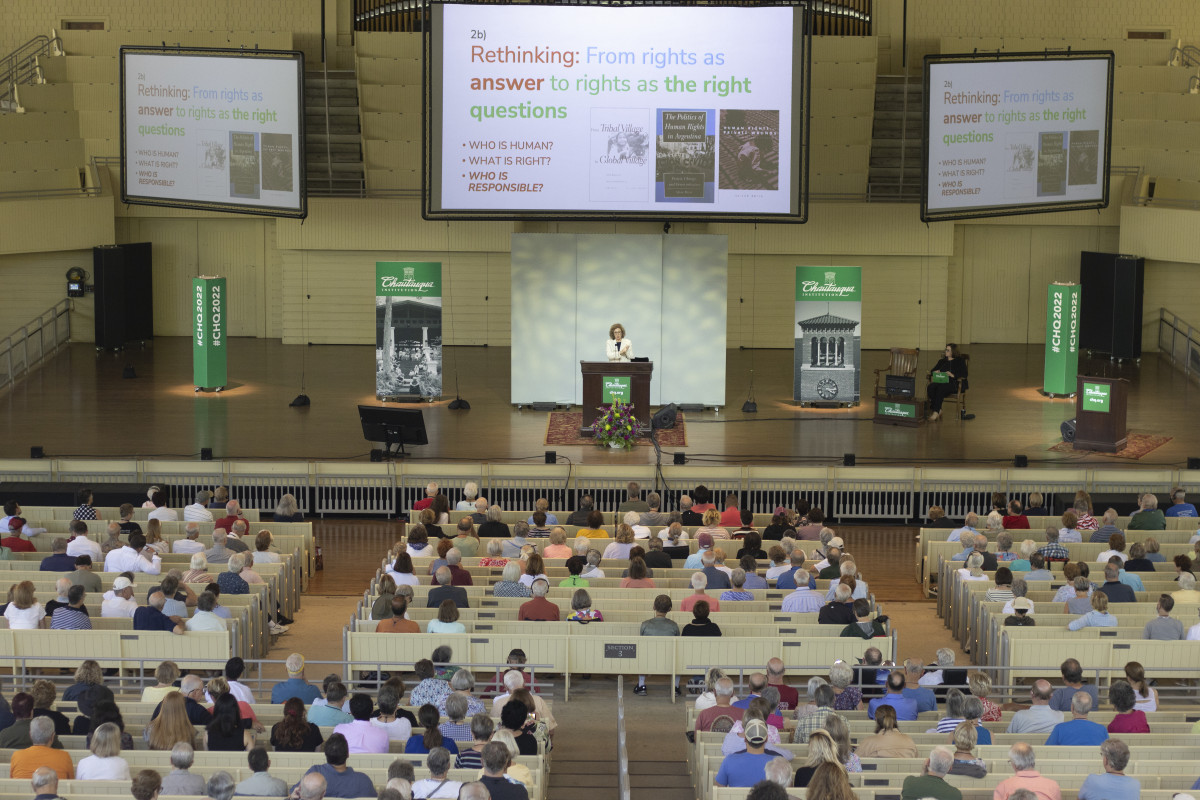Alison Brysk, Mellichamp Chair of Global Governance at University of California, Santa Barbara, is working to re-engage social science, research, and historical, journalistic investigations to bring them together toward civic action.
Brysk delivered her lecture “Contesting the Future of Human Rights, Now More than Ever” at 10:45 a.m. Monday, July 11, in the Amphitheater to start off Week Three of the Chautauqua Lecture Series, which shares a name with her 2018 book, The Future of Human Rights.
“(I want to) offer a revisiting, a remapping and a revisioning of human rights that can be based on that previous knowledge and experience and building upon the work of my colleagues … that I have witnessed worldwide,” Brysk said. “I have literally done research and participated in human rights movements on every continent except Antarctica.”
Americans tend to get lost in their own bubble and Brysk said there’s an academic debate concerned with the human rights movement. Some people believe that human rights are at an end, while others believe there’s been a lot of progression in the evolution of human rights.
“I say yes to both,” Brysk said. “We are in an era of a combination of historic progress, hard times and harsh criticisms, and due criticism that really needs to be addressed.”
From the abolition movement to the Anti-Apartheid Movement, Brysk said there’s a powerful arc in historic progress.

“We have the establishment of legal mechanisms and accountability mechanisms for human rights abuse (that is) very imperfect (and) very incomplete,” Brysk said.
Maria da Penha is a Brazilian woman who was a survivor of domestic violence abuse that lasted for 10 years. da Penha then became the leader of a long-standing political movement campaigning against domestic violence.
She appealed to the Brazilian government for help and received none, but in 2005, after a national political movement, Brazil passed domestic violence legislation. Brysk said there have been thousands of lives saved from different forces and movements, and she wanted to emphasize this happened because of one person.
But, “times are hard,” Brysk said, and there are more people forcibly displaced than at any moment in human history — the refugee crisis is now believed to affect at least 100 million people worldwide.
“The human rights system was always unfortunately contingent and dependent upon having citizenship, even though you’re supposed to have universal human rights,” Brysk said. “If you didn’t have high quality citizenship, you were always impaired.”
Connected to this contingency is the persistence of war crimes, despite mechanisms that were set up in response to genocide and the Holocaust. Brysk said she sees similar “repetitions of those same kinds of things” in places like Syria, Yemen and Ukraine.
Within the human rights system, Brysk said, there are three lines of criticism coming from scholarly circles, civil societies and those suffering from human rights abuses. The first line of criticism is that universal and international rights impinge on sovereignty, and rights should be determined by individual governments.
The second line of criticism is the opposite, that international human rights are not enough, and that they should not be limited to political and civil rights, but should also include economic and cultural rights.
The third line of criticism, Brysk said is “rights are the wrong kind,” meaning too Western, too legal, and that they do not reach the full range of expression of human rights.
“We need equity,” Brysk said. “We need justice (and) we need other kinds of ways of thinking about our social needs and our social goals.”
Gaps in understanding and lost potential are other issues connected to human rights.
Brysk said there are global gaps and unrealized potential for four reasons: one, a rapid rise in social inequality; two, rising security threats; three, intensifying global problems; four, the COVID-19 pandemic.
She said what is needed is an ethos of human rights in terms of a “legal doctrine and a set of governance that people could use, such as a toolbox.”
The questions on human rights continue, and Brysk has written several books exploring them. One such question Brysk has explored is: “Can we define human rights?”
“Human rights are questions, they’re not answers,” Brysk said. “What they are is a set of social questions that are asked by movements, by people, communities, states, international agencies, and those questions are the big governance question.”
Brysk said she’s had three main projects so far in her career.
The first was her book, The Politics of Human Rights in Argentina, about the country’s transition from a military dictatorship.
Second, she traveled to different Latin American villages asking “Who is a human?” in regard to people who had been categorized as “noncitizens” or “nonhumans,” and whose rights were not being acknowledged by authorities.
Brysk’s third and final project so far is her book, Human Rights and Private Wrongs, in which she asked questions of human rights, globalization, human trafficking and war crimes.
Issues of human rights have become interdependent on other issues, like the climate crisis, Brysk said.
“All of these things that were considered social problems that need to be negotiated internationally are now automatically rights problems,” Brysk said. “The footprint of how climate change is influencing social inequality, (and) is displacing refugees, is contributing to conflict that displaces people.”
There’s good news and bad news, Brysk said. The good news: “We have national constitutions and charters that incorporate human rights,” Brysk said. “As Americans, we can be aware that there are better options out there for incorporating international law into our domestic law.”
The bad news: Democracy is declining in Turkey, Brazil, the Philippines and the United States.
“We do have these new kinds of challenges, we do have contributing responsibilities and contracting inclusion,” Brysk said. “… But we have a number of countries that have dropped out, or challenged, or refused to acknowledge the authority of the international criminal court.”
As she noted earlier, human rights are questions and not answers, but Brysk did leave the audience a note to sum up the future of human rights. She quoted Italian philosopher Antonio Gramsci and his idea of pessimism of the mind, but optimism of the will.
“So we really need to be clear and global in our analysis,” Brysk said. “We need to really think through where the problems are, how the problems are changing (and) where are we falling short? We need to be honest.”
Brysk said this analysis will help human rights move forward, but the real work will not be any document or legal court.
“It is movement. It is action. It is socialization,” Brysk said. “We can use strategic analysis that we apply in other areas of our lives to contest the gaps and the regressions. The breaking agenda is to translate the global to the local. To persist. To reconstruct nationalism. To focus on memorandum initial and to act locally.”
She drew on Eleanor Roosevelt at the end of her lecture — who was the chair of the United Nations Commission on Human Rights.
“Without concerted citizen action to uphold them close to home,” Roosevelt said, “we shall look in vain for progress in the larger world.”





